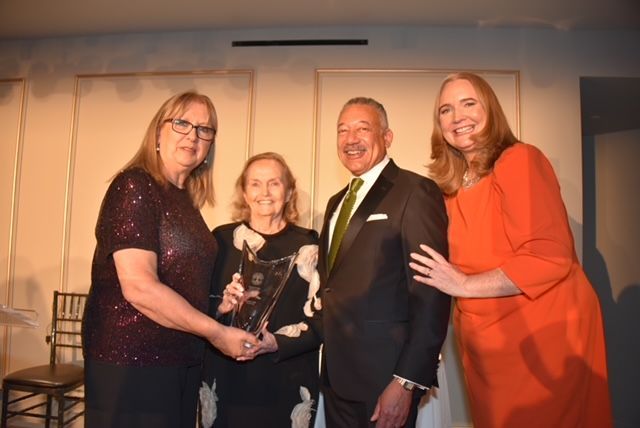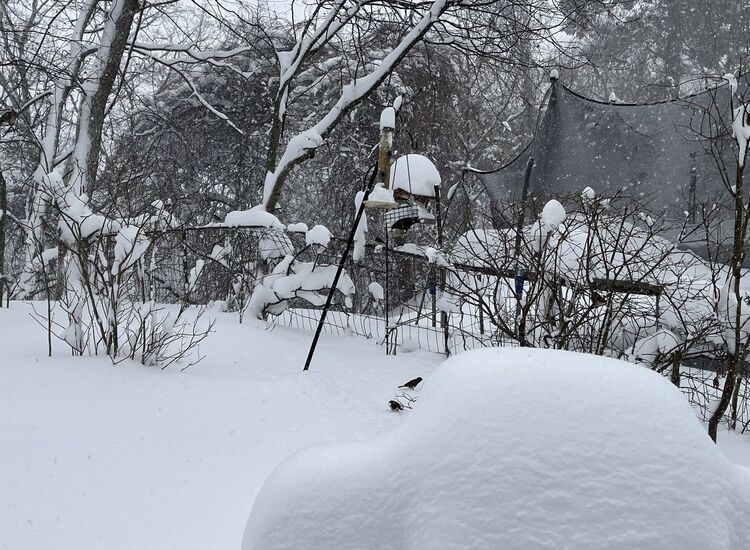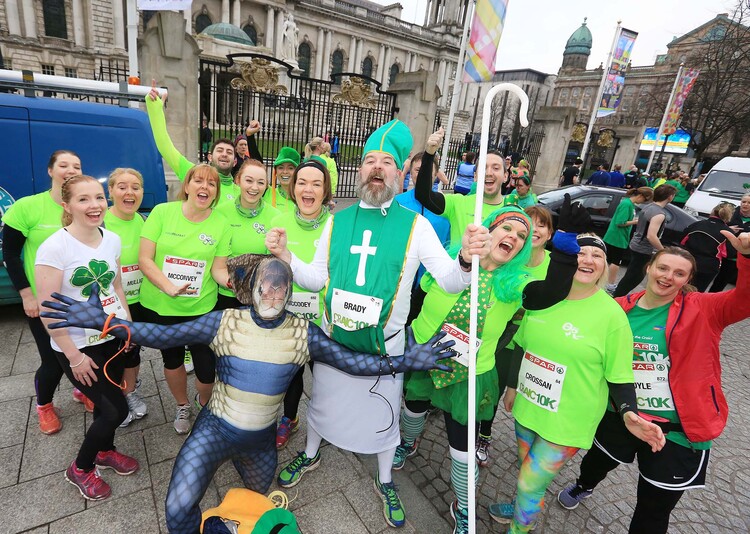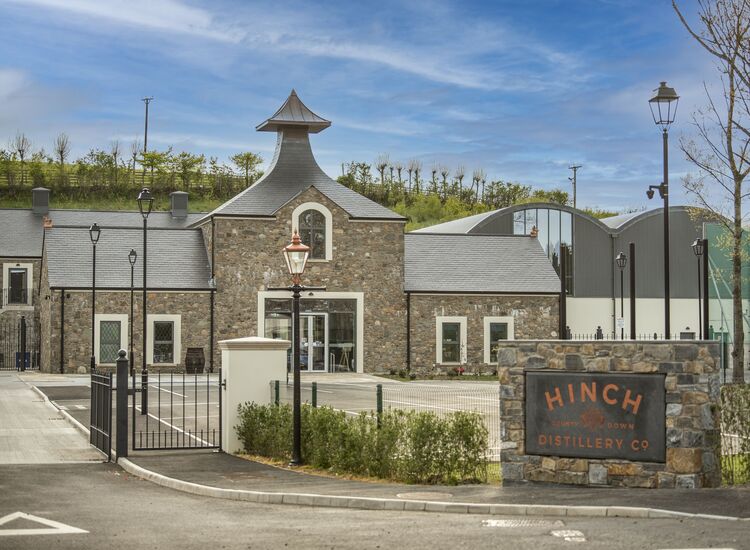The African American Irish Diaspora Network held its Inaugural Annual Leadership Awards Gala on Thursday, September 29 in New York. The Keynote Speaker was Dr. Mary McAleese, Chancellor of Trinity College Dublin and former President of Ireland. Her address focused on Frederick Douglass and Daniel O’Connell with the theme "Widening the lens of history - a new future from a recast past." This is the full version of Dr. McAleese's address.
What a wonderful occasion this is and what a joy to be part of it. I know in back of it there has been a vision and a huge effort to give it life. It is a watershed event, an epoch changing event and I am indebted to African American Irish Diaspora Network and proud to be counted among its first honorees, to be in such inspirational company. Thank you to Dennis Brownlee and Carla his right-hand organizer par excellence, to our wonderful new Ambassador to the United States Geraldine Nason Byrne, to that amazing champion of all things good about Ireland Loretta Brennan Glucksman and thank you to all those gathered here. Congratulations to my remarkable co-honorees.
It was this month one hundred and seventy seven years ago that Frederick Douglass, America’s most celebrated or notorious fugitive slave depending on who was speaking of him, and many then were, set sail for the islands known as Great Britain and Ireland. He had more than one reason for that historic visit but high on his list was his desire as he said himself to “visit the land of my paternal ancestors."
Congratulations to The African American Irish Diaspora Network @aaidnetwork on their very successful and special inaugural diaspora leadership gala in Manhattan Manor. A great night with honorees @HenryLouisGates, Mary McAleese, John Samuelson & @figoreilly. pic.twitter.com/azwIY377dq
— NI Bureau (@NI_Bureau) October 2, 2022
He was no stereotypical red-haired, freckle-faced, blue-eyed, white skinned grandson of an Irish immigrant and though many would have denied him not only his freedom but his claim to Irish heritage, today in this place and in these times we are privileged to count him among our most distinguished American Irish ancestors and to acknowledge that the vast Irish diaspora which is so much part of the warp and weft of Irish history and heritage includes almost forty percent of all African Americans.
We are his family. He is ours, not solely because he saw in the suffering of the Famine Irish under colonial Britain the suffering of African slaves under their colonial masters and mistresses, and empathized as one victim would with another….. no he is ours by blood, by a kinship of DNA and genes, which in his day and in the generations during which slavery flourished, conferred little credit but much power and wealth on those paternal ancestors and conferred little love on the overlooked children it produced. No, those paternal ancestors could masquerade as Christians, as respectable and respected citizens but only for as long as their silent slave offspring remained silent. As Douglass scathingly said, “I love the pure, peaceable and impartial Christianity of Christ: I therefore hate the corrupt, slave-holding, women-whipping, cradle-plundering, partial and hypocritical Christianity of this land. Indeed I can see no reason, but the most deceitful one, for calling the religion of this land Christianity."
Frederick Douglass had the brain-power, the courage, the power of words and the determination to tell the truths that would expose the hatred and the hypocrisy, the greed and the violence which allowed slavery to flourish, made slave-owners rich, powerful, influential and famous and consigned slaves to the unseen dank corners of history. For as long as the slave owners wielded political power, including the power of owning the narrative of history and its telling, they were safe from the even greater power of truth and justice, equality and accountability. The narrow lens of history hagiographed them onto plaques and plinths, immortalized them, kept their fake memory safe often in institutions that bore their names. But today the lens of history is widening.
Through the wider lens of history today, prized open by scholarship, advocacy, story-telling, human rights advocacy, the onward push for equality and the pursuit of truth, we see things differently. Today everywhere the layers of carefully concealed history are being peeled back, allowing us to hold to account in our times those who corrupted history, made it their own and held the stage. Well no more.
Today statues of the once great are pushed from their plinths, reparation is made to or demanded for the descendants of those whose lives they destroyed. A new future is being made from a past retold…. Universities, Museums and archives check their holdings and ask themselves questions about the legitimacy of their acquisitions, questions once unthinkable. New answers are changing the course of tomorrow. In my own home city of Belfast a statue will be raised to Frederick Douglass and a long overlooked Irish woman, Mary Ann McCracken who stood at Belfast docks campaigning against slavery until her dying breath in 1866 has at last begun to emerge from the obscurity those who dominate history with their greed confers on those who try to change history with goodness.
At the beginning of his famous memoir, which broke open the hermetically sealed citadel of the slave-owners and their slaves, Frederick Douglass poignantly remarks that no slave knew his or her own birthday. “The white children could tell their ages. ....my master deemed all such enquiries on the part of a slave improper and impertinent.”
He never knew who his father was. He only barely knew his mother. Yet the casual barbarity to which he was routinely subjected throughout his life, conduced not to a wholly justifiable raging over-powering anger, but to a refined and principled intellect with a relentless focus not simply on emancipation but on vindicating the innate God given dignity of every human being. Little wonder then that he found a soul-mate, a brother in Ireland’s Daniel O’Connell, our great Liberator and unparalleled champion of the human rights of all oppressed peoples whether Russian Jews, Irish Catholics, African American slaves, or English Presbyterians. The name John Hume gets an honorable mention here tonight for he can truly claim in every way to be the man who brought O’Connell’s work of peace to fruition a century and a half after his death in the Good Friday Agreement.
But back to O’Connell’s times in the mid nineteenth century. When Frederick suggested to a meeting in Ireland that America needed a “black O’Connell” it was a multi-layered and provocative compliment likely to offend many of O’Connell’s republican supporters for they were not all persuaded by the idea that slavery was wrong and he suffered the onslaught of friend and foe alike for his support of abolition which was a call to equality.
In their day, when the British Empire believed itself entitled to the ownership of Ireland, her land, produce and her people, the starved bodies of a million Irish men women and children rotted in the fields. They lay nine deep in the miles long ditch across from my paternal ancestors’ home, their children died from internal bleeding from being fed charity food unfit for human consumption as shiploads of safe edible food sailed out from Irish ports to feed the well-to-do of the empire. Although slavery had been abolished in Britain before the Irish Famine and before Douglass’ arrival, it was British merchants who were deeply implicated in and hugely enriched by the Atlantic slave trade of the 16th to the 19th centuries which had created the abysmal context of Frederick’s life.
They constituted a powerful political, economic and religious establishment, an elite whose high-reputational shelf-life and whose long-term influence is only now beginning to run past its sell-by date. Across the world they stretched their empires of graft and greed, their plantations funded what became great institutions, universities, museums, celebrated archaeological and anthropological collections, statues and street names - all testified to their benevolence, their legacy of endowments, their enduring power and influence over our thinking, our structures.
Their haloes were burnished, buffed, shone to glistening by histories which never turned a critical eye on their dark side, on the evil that men and institutions did to become such towering figures of history. More than that in this world where we talk of cancel culture, these towering figures had the judicial power to cancel anyone they chose, the political power to cancel any group they chose, the economic power to cancel whoever and whatever they chose, the social power to include whom they chose and exclude whom they chose.
Today more and more we cancel their version of their stories. We do not revise history for the sake of it but forge new collaborations to tell it anew for the sake of truth, inclusion, equality in our time- to right the record, to right the old catalogue of wrongs, to repair where we can and take responsibility where we must. Above all to learn. And above all to heal. For there is much to heal. In his magnificent new book Testament, Ireland’s leading poet Micheal O’Siadhail, who is with us tonight, says “a hurt can beget a hurt/more wars more feuds/ a merry go-round of settling older scores. There’s such sweet relief when bitter sores can heal."
The powerful cancel culture of those past elites created bitter, unhealed sores for it worked remarkably well even in and especially in courts and parliaments, in educational, research and archive establishments that pride themselves on principled scrupulosity until, that is, second and third level education produced a cohort with a new kind of searing scrupulosity and curiosity, more akin to that of Douglass and O’Connell and wonderfully described by Seamus Heaney as having “intelligences brightened and unmannerly as crowbars." “What looks the strongest”, he says, “has outlived its term. The future lies with what is affirmed from under."
And so, from the days when Douglass and O’Connell faced that world of walls of bigotry, hypocrisy and embedded powerful elites, to which they applied their formidable intellectual crowbars, to our day when those walls though still standing under many guises, are beginning to be dismantled bit by painstaking bit. The work of Douglass and O’Connell continues in an army of scholars and activists who are now dedicated to exploring the many ways subtle and unsubtle in which the histories of colonialism, imperialism, slavery, religion, class, race, gender, elites, exploitation, exclusion have informed our context, shaped it, shaped us for good or ill.
Just how quickly our perceptions are being challenged to change by the sound of different voices from the past was brought home to me when I began work at the end of 2018 as Professor of Children Law and Religion in the University of Glasgow, one of the oldest universities in the English speaking world heading for its 600th anniversary in 2051. I had the good fortune to have an office in the very elegant Professor’s Square, a few meters from the chapel. I wandered over to an evening service and encountered at the back of the chapel the exhibition which was to thoroughly shake me. It told the story of the extent to which the University owed its development to donations and benefactions from slave-owners. In short order the University’s Vice-Chancellor Anton Muscatelli had pledged that the University would raise 20 million pounds to be used for “reparative justice” and a new center for Slavery Studies was founded. It was clear a new era was upon us as institution after institution revisited its past, Dalhousie in Halifax, Nova Scotia, King’s College London, Harvard, Yale, University of Pennsylvania, Georgetown, The University of the West Indies, the University of Cape Town.
From a conversation with then Provost of Trinity College, Paddy Prendergast, Trinity’s Colonial Legacies Project was formed with its scholarly remit stretching beyond but including slavery as an issue. Like a Mexican wave the flag of research based decolonization and black studies initiatives has spread. Yesterday’s heroes are no longer guaranteed their plinths, their public statues, their names carved in stone over libraries and museums or on painted on street nameplates. Today’s prized museum exhibits may be tomorrow’s humbly and apologetically returned inappropriately appropriated trophies.
Heading for two centuries after the seminal work of Douglass and O’Connell we are heading into new territory. There is an amount of unlearning ahead of us. There is no clarity or consensus around how to deal with a past we cannot change but which still exercises a powerful grip on the malign thinking in back of racism, sexism. A decade, perhaps even a century of reexamination lies ahead - of academic conferences, revised text books, new thinking, push back from old-thinking and from inside the hallowed walls of academe questions and decisions will tumble out that will impact many of us locally.
Are we ready to face into it? We love that Barack Obama is descended from a white Irishman but what of Michelle’s story that she lived in a house built by an Irish man who owned slaves, the White House, or that she is a descendant of a slave owned by an Irish man. We have a lot to learn and unlearn.
Across the world the name of Irishman George Berkeley, one time Bishop of Cloyne, is revered. Towns are named after him, universities, institutions, libraries. In his alma mater of Trinity College a wonderful library bears his name as does a window in the College chapel. Unknown to most of us until recently he was a slave owner and a hugely influential theologian who justified slavery on biblical grounds. I once lived near Newry, County Down where a prominent statue commemorates the 19th century militant Protestant Republican John Mitchel, who broke with O’Connell over the use of violence and who remarkably espoused slavery.
Regrettably, Mitchel came under the influence of the famous Scot Thomas Carlyle, that complex virtuoso whose brilliance was offset by a litany of formidable bigotries that today provoke cancellation from the pantheon of heroes. That itself is quite a telling irony for the man who wrote so fiercely about the compelling role of heroes in making history dance to their tune.
The music around Carlyle has grown muted just as it has around Mitchel. Today, the strong messages to our world, the messages of real and enduring integrity, come from O’Connell who believed he died a failure and Fredrick Douglass, who died free but who could see the decades ahead of damage that slavery had seed-bedded.
They warn us never to give up, to choose our heroes carefully, to follow the leadership of those who do not seek short-term or selfish gain but who are prepared to dedicate themselves heroically to a future they may not live to see but which is that farther shore they headed out into the deep to reach, to colonize with love and laughter, equality and decency, where human dignity for all flourishes and the past really is another country whose secrets and vanities are known, outed and ended.
Where the future is an open highway for all. But leading where? It has to lead to healing, to reconciliation, to a wide and warm embrace of all our family. How wonderful it is to be part of the African American Irish family celebrated here tonight, in each other’s company here tonight. Thank you for bringing our family together, estranged for too long by poorly told history for not for much longer. This gathering is seismic. Epoch changing. Our narrow image of what it is to be Irish can never be the same. The lens of history has zoomed out and what a wonderful array of family we now see, we now are. Let’s work together as the family we are to heal the still raw wounds of that woeful history we cannot change but can now tell differently, must tell, will tell truthfully.








